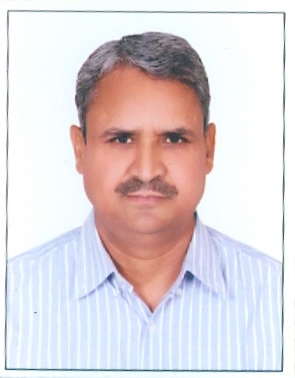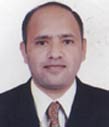
SCIENTIST
Soil & Crop Management
Name and DOB: Manish Kumar, 10.03.1986
Central Soil Salinity Research Institute (CSSRI),
Indian Council of Agricultural Research
Karnal, Haryana (INDIA) 132 001
E-mail: manish.kumar2@icar.gov.in / manish.rrm@gmail.com
Phone: 9882881558/ 7015094369
Academic qualification
- Sc. (Forestry)- University of Agricultural Science, Banglore, Karnataka (2010)
- Sc. (Agroforestry) – G.B. Pant University of Agriculture &Technology, Pantnagar. (2012)
- Foundation course for agriculture research services (99th FOCARS) held during 1st Jan to 31st March, 2014 at NAARM, Hyderabad.
- 4- month ‘Certificate Course on Soil & Water Conservation and Watershed Management’ organized during 8/10/2014 to 7/02/2015 by ICAR- IISWC, Dehradun.
- Current position and past affiliation(s)
- 03.2017 to till now – Scientist (Agroforestry) at ICAR- Central Soil Salinity Research Institute, Karnal, Haryana, INDIA.
- 04.2014 to 28.03.2017- Scientist (Agroforestry) at ICAR – Indian Institute of Soil and Water Conservation (IISWC), Dehradun, Research Centre, Datia (MP), INDIA.
- 01.2014 to 31.03.2014 – Scientist (Agroforestry) at ICAR- National Academy of Agricultural Research Management (NAARM), Hyderabad.
- Priority research areas of interest
Reclamation and productivity enhancement of salt affected soil through agroforestry intervention, Physiological adaptation of trees to saline ecologies, Selection of elite planting material and its evaluation, Bio-drainage, Biomass estimation, Carbon sequestration and Nutrient cycling in agroforestry, Forestry/Agro-forestry for SWC and watershed management.
- Research projects (in-house/external) in hands with name of funding agency
- Evaluation of potential Olive germplasm for salt affected soils. (In-house)
- Impact of Eucalyptus plantations in waterlogged saline ecologies of Indo-Gangetic plains. (External funded)
- Total publications
Research papers in referred journals:
- Manish Kumar, Dev Narayan, R.S. Yadav, Prabhat Kumar, Rajeev Ranjan, M. Pramanik and 2018. Performance of Aonla with in-situ Moisture Conservation Techniques. Indian Journal of ecology. (Accepted)
- Manish Kumar, Suresh Kumar, A.R. Uthappa and Shiran kalappurakkal. (2018). Influence of Prosopis cineraria on microclimate conditions under agroforestry system in arid region, India. Indian J. of Agroforestry. 20 (1): 35-39.
- Manish Kumar and Suresh Kumar. (2018). Sprouting and Survival of Cactus pear as Influenced by Moisture Loss of Cladode in Arid Region, India. Multilogic in Science, 8 (Special issue-A): 15-18.
- Narayan, D., Prabhat Kumar, Manish Kumar and Yadav, R. S. (2017). Rainwater harvesting practices and resource conservation in agroforestry system in red soils of Bundelkhand. Indian J. of Agroforestry, 19 (2): 34-37.
- Uthappa, A. R., Chavan S.S, Singh M., Sridhar, K.B., InderDev, Asha Ram, Sathish B.N., Manish Kumar, Dwivedi R.P., Ramesh Singh, Singh R.K., Rajendra Singh, Tewari R.K., Handa A.K. and Chaturvedi, O.P. (2016). Tree diversity in ravines and their rehabilitation through agroforestry interventions in Bundelkhand Region of India. Indian J. of Agroforestry 18(1):77-83.
- Uthappa A.R, Bana OPS, Manish Kumar and Kanwal M. (2015). Soil physico-bio-chemical properties as influenced by varying tree densities in poplar (Populus deltoids ex Marsh.) based agroforestry system. Indian J. of Agroforestry. 17(1): 81-90.
Book chapters/ Training manuals:
- Banyal R., Rajkumar, Manish Kumar, Yadav R.K., Dagar J.C. (2017) Agroforestry for Rehabilitation and Sustenance of Saline Ecologies. In: Dagar J., Tewari V. (eds) Agroforestry. Springer, Singapore. Pp 413-454.(org/10.1007/978-981-10-7650-3).
- Yadav, R.S., Ranjan, R., Manish Kumar and Pramanik, M. (2017) Parameterization and Assessment of Greenhouse Gases in Integrated Farming System. In: Carbon Sequestration and Green House Gases Measurement in IFS Models (eds. Dutta et al., 2017), ICAR-AICRP on Integrated Farming Systems Research, Modipuram, Meerut- 250110, U.P., India, p. 1-186.
- Ravindra, N., Chavan, S.B., Uthappa A. R., Sridhar, K.B., Manish Kumar and Dhiraj Kumar. (2015). Scope of TBOs promotion through Forest Department. In: Lead Papers, National Workshop on TBOs-Way Ahead, 15-16, October, 2015. pp 97-110.
Popular article:
- Madal A K, Ashim Datta, Manish Kumar, Singh J, Singh V and Singh R K. 2017. Basmati CSR-30: doubling farmer’s income in sodic soils. ICAR NEWS. 23(4):10-11.
- राम किशोर फगोडिया, बाबू लाल मीना, कैलाश प्रजापत, राजेश कुमार मीना, अरिजित बर्मन एवं मनीष कुमार. 2017. टिकाऊ कृषि उत्पादन के लिए उचित नाइट्रोजन प्रबंधन। कृषि किरण, वार्षिकांक-9. भाकृअनुप- केन्द्रीय मृदा लवणता अनुसंधान संस्थान, करनाल-132001.
- ए. के. मंडल, अशीम दत्ता, मनीष कुमार, जोगेंद्र सिंह, विजयाता सिंह और आर. के. सिंह. 2017. बासमती सीएसआर-30: क्षारीय मिट्टी और निम्न गुणवत्ता परिस्थितियों भूजल में किसान की आय दोगुनी करने का अग्रगामी तरीका। लवणता समाचार, 23 (2): 2.
Compendium of Abstracts: 12
- Transfer of technology & continuing education
(Teaching/mentoring activities)
| Year | Particulars |
| 2017 | 10 credit hours: Delivered a lecture on “Advanced technology of agroforestry” in 5 trainings conducted at research centre, Datia containing each for 25 farmers/rural youth of nine villages viz. Nayagaon, sitapur, Maheba, Murera, Chopra, Dang karera, Imaliya, Tiwaripura and Jigna during 6/3/2017 to 10/3/2017. |
| 2016 | 2 credit hours: Delivered lectures in one month summer practical training for B. Tech students (Agril. Engg.) organized at ICAR-IISWC, Datia during 1-30 June, 2016 in which 14 students (9 students from CAE, JNKVV, Jabalpur, MP and 5 students from CAET, Godhra, AAU, Gujrat) were participated. |
| 7 credit hour: Practical class and exposure of agroforestry measures for drought prone area at CAFRI, Jhansi in one month summer practical training for B. Tech students (Agril. Engg.), Organized at ICAR-IISWC, Datia during 1-30 June, 2016. | |
| 2016 | Delivered lectures in two days rabi interface workshop (Krishak-Vaigyanik Paricharcha) organised by ATMA at KVK, Datia during 30-31 Dec., 2016. |
| 2015 | 6 credit hours: Delivered lectures on (1) Prospect of horticulture/forestry in watershed management and (2) Forest resource survey, Agro-forestry system for watershed, afforestation and pasture development in one month summer practical training on “SWC and Watershed Management” to B. Tech student (Agril. Engg.), organized at IISWC, RC-Datia during June 1- 30, 2015. |
| 2014 | Delivered a lecture on “horticulture and afforestation techniques” in sensitization workshop-cum-field day to farmers on 19.09.2014. |
- Extension (if any)
- Actively involved in Mera gaon and mera gaurav (MGMG), Swachh Bharat Mission.














